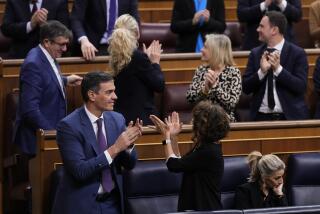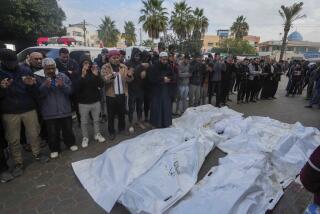Amnesty for Iraq Rebels Is Planned
- Share via
BAGHDAD — The Iraqi government has crafted a far-reaching amnesty plan for insurgents, officials close to Prime Minister Nouri Maliki said Saturday, even as guerrillas killed at least 34 Iraqis in a barrage of bombs and rockets in the capital and the U.S. military hunted for two missing soldiers.
The Americans may have been captured after an attack Friday evening on a checkpoint south of Baghdad that left at least one soldier dead, the military said.
U.S. forces dispatched helicopters and surveillance planes over the area as well as teams of divers to scour the river and nearby canals for the missing soldiers.
The amnesty plan, which apparently would include insurgents alleged to have staged attacks against Americans and Iraqis, calls for the creation of a national committee and local subcommittees to woo rebels and begin a “truthful national dialogue in dealing with contradicting visions and stances,” according to a version of the plan published Saturday in an Iraqi newspaper.
The reconciliation plan, which is expected to be formally announced soon, would be among the Iraqi government’s most comprehensive attempts to engage with insurgent groups.
“The main thing,” said Haidar Abadi, a leader of Maliki’s Islamic Dawa Party, is that the plan doesn’t rule out participation of “the bloody-handed people in the political process.”
The plan, mysteriously released and rescinded by the prime minister’s office last week, calls for the pardon and release of prisoners “not proven guilty in crimes and clear terrorist activities” and a review of the process by which former members of Saddam Hussein’s Baath Party are excluded from public life.
U.S. and some Iraqi officials have long urged Sunni insurgent groups that don’t have strong ties to the former regime’s security apparatus or to foreign militants -- and without the blood of innocent Iraqis on their hands -- to lay down their weapons and join the political process.
The new proposal, said an official close to Maliki, merely recognizes the difficulty of verifying insurgents’ past actions.
“Theoretically, we can say we cannot give any amnesty to those in the [former] security agencies and those in Saddam’s regime and those who have killed and bombed Iraqis after the invasion,” said Salah Abdul Razzaq, a spokesman for several prominent Shiite religious organizations.
“In practice, anyone who comes to negotiations and says, ‘I have no problem with Iraqis or Iraqi government, just with U.S. forces,’ how can we check that?”
Some Kurdish and Shiite members of parliament, which is scheduled to convene today, voiced doubts about Maliki’s reconciliation proposal.
“We think that any reconciliation talks should take place within parliament,” said Baha Araji, a Shiite lawmaker close to radical cleric Muqtada Sadr’s movement. “We don’t need groups from outside -- I mean the Saddamists, Baathists and killers.”
But officials close to Maliki said the plan was days away from being formally announced.
A version of the amnesty plan -- titled the “Reconciliation and National Dialogue Project” -- was published in Saturday’s edition of Al Mada newspaper. Copies were distributed to journalists and then quickly taken back at an abruptly canceled news conference Thursday at Maliki’s office.
Abadi said the incident was a minor mix-up caused by inexperienced members of the prime minister’s media office.
“It doesn’t mean that the project of reconciliation was withdrawn, but that it was given more time for a consensus to be reached,” said Abbas Bayati, a leading Shiite lawmaker. “We are ready to sit around a table with all the Iraqis, even those who participated in the resistance and now repent that.”
It was unclear whether any amnesty plan would require legislative approval or be adopted by executive decision.
Sunni Arabs lead the Iraqi insurgency, which is fueled by the minority sect’s perception that it was unjustly robbed of political power and prestige by the 2003 U.S.-led invasion and the Shiite-dominated governments that followed. Incessant insurgent attacks have sparked reprisals by Shiites and brought the country to the precipice of civil war.
Sunni Arabs said they were far more encouraged by the Maliki government’s olive branches than those of his predecessor, fellow Islamic Dawa Party member Ibrahim Jafari, viewed by many as too sectarian in his outlook.
The death this month of terrorist leader Abu Musab Zarqawi opened a new opportunity to draw in Iraqi insurgent groups, Sunni officials said.
“The general direction and general understanding among politicians is that now is the time to differentiate between the extremists and foreign fighters on one side and the native Iraqi people in the resistance,” said Alaa Makki, a leading member of the Iraqi Islamic Party, the main Sunni Arab political group.
“We think now there might be a reevaluation from A to Z among the Iraqi population,” he said. “I think Maliki is going along with these ideas.”
But the violence showed no signs of abating Saturday. Dozens of Iraqis were killed in a series of insurgent attacks targeting Iraqi security forces in Baghdad despite a highly publicized crackdown meant to bolster public confidence in the government.
At least seven large explosions rocked the capital. In the day’s most deadly incident, a car bomb explosion at 8 p.m. in a busy market in southwest Baghdad killed 12 people and injured 38, police said.
An earlier car bomb targeting a police patrol killed seven people and injured 11, hospital officials said.
A roadside bombing in downtown Baghdad killed six people and wounded 15.
In central Baghdad, a car bomb targeting an Iraqi army patrol killed three civilians and a soldier and injured eight soldiers and four police officers.
A bomb placed inside a passenger bus killed at least two civilians and injured 15, police said.
In the northern suburb of Kadhimiya, mortar rounds landed on a busy market, killing at least two people and injuring 14.
An explosion killed a man in west Baghdad, hospital officials said.
The search for the missing U.S. soldiers was underway near the Euphrates River town of Yousifiya, south of Baghdad. U.S. forces launched raids on four sites, questioned local leaders and set up roadblocks around the area, presumably to prevent assailants from taking the soldiers elsewhere.
“We are using all available assets, coalition and Iraqi, ground, air and water, to locate and determine the duty status of our soldiers,” Maj. Gen. William B. Caldwell IV said in a news release.
The attack Friday evening took place in a religiously mixed area south of the capital known as a stronghold of militants loyal to extremist religious groups, including Zarqawi’s Al Qaeda in Iraq.
U.S.-led forces at a nearby checkpoint began radioing their colleagues after they heard an explosion and small-arms fire but could not make contact.
Backup forces sent to the checkpoint discovered the dead U.S. soldier and learned that two were missing, the military said.
Times staff writers Saif Rasheed and Caesar Ahmed and special correspondents in Basra and Ramadi contributed to this report.
More to Read
Sign up for Essential California
The most important California stories and recommendations in your inbox every morning.
You may occasionally receive promotional content from the Los Angeles Times.












